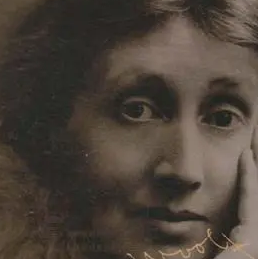Virginia Wolf (1882-1941) is a British female writer. Born in a scholarly family, his father is a famous scholar and agnostic philosopher, as well as a biographer and publisher. Virginia was frail and sickly since childhood. She often stayed at home to read her father’s books and receive his father’s education. She shared the same interests with the journalist Leonard Wolff and married in 1902. After her father died in 1904, she moved to London, and her residence became the venue of the Bloomsbury literary group. In this group, there are novelist Emma Foster, who has a great influence on her literary creation, and Roger Fry, a famous post-impressionist painter and art theorist.
Virginia is one of the pioneers of modern fiction. She tried hard to experiment with new creative methods, focusing on revealing the inner activities of the characters and disdaining the trivial description of objective activities. She tried to reform the traditional concept of time, ignoring clock time and paying attention to psychological time. Her first experimental product was Jacob’s Room (1922). In this work, she used the stream of consciousness technique for the first time, making time and scene change frequently. The growth activities of the protagonist are reproduced in the short clock time. Her “Mrs. Dalloway” (1925) shows that she has completely broken away from the track of traditional creation. To the Lighthouse (1927) is generally regarded as Mrs. Wolf’s best work. The novel is based on the author’s childhood life and has autobiographical elements. In this work, Mrs. Wolfe developed her own writing skills and used symbolism to express the deep consciousness of the characters. Mrs. Wolf’s other works include historical fantasy novels Orlando (1928), The Waves (1931), The Years (1937), Between the Acts (1941), etc. The Wave is a typical stream of consciousness novel. The novel is very obscure and difficult to read because it uses a lot of inner monologues. Mrs. Wolf is also a famous novel critic. She has made great efforts to explore and explore modern novels.
The Duchess and the Jeweller is one of Mrs. Wolf’s best short stories. The protagonist of the novel is a London jeweler who is attracted by wealth and status. He was very rich and successful in his career. However, he could not get rid of the memories of his poor childhood life, so he became more and more eager to get a noble position, so he made a lot of deals with the Duchess. Although this novel is not long, readers can still get a glimpse of Mrs. Wolf’s stream-of-consciousness technique. The story took place for a short time in the morning, but through the protagonist’s inner activities, the reader learned about his childhood life, growth experience and future plans. It is a major feature of Mrs. Wolff’s processing time to compress the surface activities in a very short time while allowing the psychological time of the characters’ inner activities to expand indefinitely.
At the beginning of the novel, the reader is presented with a luxuriously furnished residence in downtown London, which greatly exaggerates the wealth and luxury of the protagonist Bacon, the great jeweler. However, under the elegant clothes and gorgeous appearance, it is a psychological activity of another scene. Bacon can’t forget that he grew up in a dirty alley, stole people’s dogs, stole people’s wallets, and started his family with three diamonds. He gradually became a well-known jeweler in London and even the world. He did not live the life of poor children under the request of his mother, but succeeded in his own way – in his words, “I won the bet!” After this memory, Mr. Bacon was very satisfied. After all, he was extremely rich now. He came to his shop with great ambition and appreciated his treasure in his private room. At this time, the Duchess came. Relying on his wealth, he made the Duchess wait in the store for ten minutes without any reason. But the unpleasant childhood memories come back to me. In order to overcome the sense of inferiority brought about by childhood life and add momentum to himself, Mr. Bacon presented the most expensive luxury goods. However, the Duchess’s incomparable nobility and grandeur overwhelmed the major jewelers. In the ensuing silent contest between the two, although the jeweler tried to keep himself, he was still led by the Duchess by the nose, because she was holding the temptation of status in her hands. Mr. Bacon saw the beautiful scene of boating with the Prime Minister and the Duchess’ young lady. Although the big jeweler is already very rich, his poor background always torments him. He has to sacrifice money to get close to the powerful people, and finally reach the highest position of being rich and expensive. Therefore, the shrewd businessman was deceived many times, but could not interrupt the transaction with the Duchess.
In addition to successfully reflecting psychological activities, this novel also has a distinctive description of the plot. The author has mobilized the reader’s sense of sight, hearing and smell. There is a large section and several other parts in the novel that highlight the nose of Mr. Bacon, and compare his demand for fame and fortune to that of a boar sniffing the truffle root, vividly portraying the image of a greedy and shrewd jeweler. It is mentioned twice in the article that I heard the noise of Pound Street from Mr. Bacon’s dark and quiet private room, which is consistent with the pleasant mood of wealthy businessmen when they taste their success and wealth alone. In addition, there are more descriptions of light in the article, and there are more than a dozen places where light is “shining”. All these glittering lights add to the alluring brilliance of wealth and status. When reading this novel, readers will feel that they are not only reading, but also smelling the smell, listening to the sound, and looking at the brilliance, which is very vivid.
